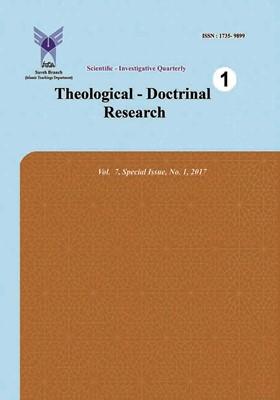The Effectiveness of Teaching Philosophy for Children on Students' Affective Control
Subject Areas : Islamic theology
Keywords: Emotions control, philosophy for children, students,
Abstract :
The purpose of this study was to investigate the effect of teaching philosophy for children on students’ emotions control. The research method was semi-experimental. The statistical population of this study was all first grade high school students in Hamadan city in the academic year 2015-2016. Two groups (15 students in each one) were selected from the third grade high school students as the sample. The emotions control scale was used to measure the emotions control. Descriptive and inferential statistics (covariance analysis) were used for analyzing the collected data. In this study, the research community method was performed for 8 sessions (plus a session for taking emotions control test) of 70 minutes with the experimental group (one session each week), which the first session was held as a preparatory session. Seven sessions were also held as major sessions. The results of the research hypothesis test showed that teaching philosophy for children reduces anger in students, decreases depressed mood and decreases anxiety in students. Also, the results showed that the teaching of philosophy for children increases the positive emotion in the students
پیرانی ،ذبیح (1392). ((اثر بخشی برنامه آموزش فلسفه برای کودکان بر خود بازداری هیجانی ،قضاوت اخلاقی ورضایت از زندگی دانش آموزان پسر پایه پنجم ابتدایی)) رساله دکتری در رشته روان شناسی تربیتی،دانشکده علوم انسانی واجتماعی ، دانشگاه آزاد اسلامی واحد علوم و تحقیقات.
حاتمى، حميد رضا ،كريمى،يوسف،و نورى،زهرا.( 1389). بررسى تاثير اجراى فلسفه براى كودكان در افزايش هوش هيجانى دانش اموزان دختر مقطع راهنمايىمدرسه شهداى آزادىتهران در سال تحصيلى 89-88 . تفكر و كودك . پژوهشگاه علوم انسانى و مطالعات فر هنگى ،سال اول، شماره دوم،22-3
صفایی مقدم،مسعود.(1388) بررسی وتحلیل((نهضت آهستگی)) وآن چه برای ((نهضت فلسفه برای کودکان)) دراختیاردارد.فصلنامه ی فرهنگ:ویژه ی فلسفه برای کودکان ونوجوان،سا ل بیست ودوم،شماره ی اول، 82-59.
صفایی مقدم، مسعود (1377). برنامه آموزش فلسفه به کودکان. فصلنامه علمی ـ پژوهشی علوم انسانی دانشگاه الزهرا (س)، سال هشتم، شماره 26 و 27، 184-161.
صفایی مقدم، مسعود؛ مرعشی، منصور؛ پاک سرشت، محمد جعفر؛ باقری، خسرو و سپاسی، حسین (1385). بررسی تأثیر روش اجتماع پژوهشی در برنامه آموزش فلسفه به کودکان بر پرورش مهارت¬های استدلال دانش¬آموزان پسر پایه سوم راهنمایی مدرسه نمونه دولتی اهواز. مجله علوم تربیتی و روان شناسی، دوره سوم، سال سیزدهم، شماره 2، 54-31.
فیشر ،رابرت (1385).آموزش تفکر به کودکان .ترجمه مسعود صفایی مقدم وافسانه نجاریان ،اهواز ،انتشارات رسش.
فیشر ،رابرت ، (1389). داستا نهایی برای فکر کردن، ترجمه سید جلیل شاهری لنگرودی،تهران ،انتشارات پژوهشگاه علوم انسانی ومطالعات فرهنگی
فیشر، رابرت (2001). آموزش تفکر به کودکان. ترجمه مسعود صفایی مقدم و افسانه نجاریان (1385)، اهواز: رسش.
کم ، فیلیپ ،داستانهای فکری (1) کندوکاوی فلسفی برای کودکان ،ترجمه احسانه باقری(1384)،تهران ،انتشارات امیرکبیر
کم،فیلیپ.(1384). داستان¬های فکری، کندوکاوی فلسفی برای کودکان. ترجمه احسانه باقری. تهران: امیرکبیر.
لیپمن،ماتیو.(1389).فلسفه برای کودکان ونوجوانان چیست؟ دراثرسعید ناجی(گفتگووترجمه)،کندوکاوفلسفی برای کودکان ونوجوانان،جلد اول،گفتگوباپیشگامان انقلابی نودرتعلیم وتربیت(صص 27-23) تهران: پژوهشگاه علوم انسانی ومطالعات فرهنگی.
مرعشی، سید منصور.(1388).پویایی های اجتماع پژوهشی دربرنامه ی آموزش فلسفه به کودکان،فصلنامه ی فرهنگ: ویژه ی فلسفه برای کودکان ونوجوانان،سال بیست ودوم،شماره ی اول.
ناجی،سعیدوقاضی نژاد،پروانه(1386).بررسی نتایج برنامه فلسفه برای کودکان برروی مهارتهای استدلالی وعملکرد رفتاری کودکان.فصلنامه ی مطالعات برنامه درسی،سال دوم،شماره ی هفت،150-123.
هدایتی،مهرنوش.(1388). بررسی تاثیر اجرای برنامه ی فلسفه برای کودکان بربهبودروابط میان فردی دانش آموزان، فصلنامه ی تازه های مشاوره، شماره ی 32.
هدایتی،مهرنوش.(1390).فلسفه براى كودكان و كنترل پرخاشگرى، پژوهشگاه علوم انسانی ومطالعات فرهنگی،سال دوم،شماره ی اول (109 -134)
هدایتی،مهرنوش.(1391).پرورش هوش معنوى از طريق برنامه فلسفه براى كودكان ، پژوهشگاه علوم انسانی ومطالعات فرهنگی،سال سوم،شماره ی اول (166 -135)
Dunham, G . D . 2008. Emotional skill Falnes and Marital Satisfaction Unpublished Doctorral Disseration . University of okran.
Fisher, R. (1995). Teaching Children to Learn. London: Blackwell/Simon and Schuster/Stanley Thornes.
Fisher, R. (1998). Teaching Thinking: Philosophical Inquiry in the Classroom. London Continum.
Gross, J. 1998 . The Emerging Field of Emotion Regulation :An Integrative Review, Review of General psychology. Vol . 2, pp. 271-299.
Lipman, M. & Bierman, M. (1970). Field experiment in Montclair. Abstract in Lipman, M. Philosophy Goes to School. Philadelphia, Pennsylvania: Temple University Press.
Lipman, M. (1980). Philosophy in the Classroom. Philadelphia: Temple University press.
Lipman, M. (1984). The cultivation of reasoning through philosophy. Educational Leadership, 42 ,1.
Lipman, M. (1991). Thinking in Education. Cambridge University Press.
Lipman, M. (1995). Moral education, higher-order thinking and philosophy for children. Journal of Early Child Development and Care, 107, 61-70.
Lipman ,M.(2003).Thinking in education ,2nd edition. Cambridge:Cambridge University press.
Lipman ,M(2004).philosophy for children Debt to Dewey. Critical and creative thinking.the Austalasian Journal of philosophy in education ,12:1 ,1 ,8.

